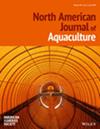In silico Evaluation of Outer Membrane Protein S2 as a Suitable Vaccine Candidate Against Edwardsiella tarda Infection of Fish
IF 1.3
4区 农林科学
Q3 FISHERIES
引用次数: 0
Abstract
Abstract Edwardsiella tarda is one of the primary emerging pathogens in fish aquaculture, responsible for Edwardsiellosis. The disease leads to significant economic loss to the farmers. Development of effective vaccines can minimise the disease burden. The type of vaccinations that are currently at the center of the most significant research are subunit vaccines. Outer membrane proteins (OMPs), being a component of the bacteria are very well known to be effective at stimulating immune responses in the host. In this study, the gene encoding for outer membrane protein S2 (OmpS2) of E. tarda was identified, cloned, and sequenced, followed by in silico analysis. The structure and sub‐cellular localization of the protein was first confirmed. Homology modelling of the whole protein was done and checked for its eligibility as a vaccine candidate. This was followed by identifying antigenic sites, B cell epitopes, and cytotoxic T‐lymphocyte epitopes on OmpS2. We obtained a few distinct vaccine peptides from the OmpS2. The complete genome of the fish pathogen E. tarda was subjected to genome analysis to identify potential epitopes that would bind to the fish major histocompatibility complex (MHC) molecule to elicit both humoral and cell‐mediated immune responses. This study provides valuable insights to consider OmpS2 as a potential vaccine candidate against E. tarda infection .鱼迟缓爱德华氏菌感染外膜蛋白S2候选疫苗的计算机评价
迟发爱德华菌是水产养殖中的主要新兴病原体之一,是造成爱德华菌病的罪魁祸首。这种疾病给农民造成了重大的经济损失。开发有效的疫苗可以最大限度地减少疾病负担。目前处于最重要研究中心的疫苗类型是亚单位疫苗。外膜蛋白(OMPs)是细菌的一个组成部分,在刺激宿主免疫反应方面非常有效。本研究首先鉴定、克隆、测序了迟缓叶蝉外膜蛋白S2 (OmpS2)的编码基因,并进行了计算机分析。该蛋白的结构和亚细胞定位首次得到证实。完成了整个蛋白的同源性建模,并检查了其作为候选疫苗的资格。随后在OmpS2上鉴定抗原位点、B细胞表位和细胞毒性T淋巴细胞表位。我们从OmpS2中获得了一些不同的疫苗肽。研究人员对鱼类病原体迟达绦虫的全基因组进行了基因组分析,以确定可能与鱼类主要组织相容性复合体(MHC)分子结合从而引发体液和细胞介导的免疫反应的潜在表位。这项研究为考虑OmpS2作为一种潜在的抗迟达埃希菌感染的候选疫苗提供了有价值的见解。
本文章由计算机程序翻译,如有差异,请以英文原文为准。
求助全文
约1分钟内获得全文
求助全文
来源期刊
CiteScore
2.50
自引率
0.00%
发文量
46
审稿时长
18-36 weeks
期刊介绍:
The North American Journal of Aquaculture publishes papers on new research and practical experience in all areas of intensive and extensive fish culture. Topics include broodstock selection and spawning, nutrition and feeding, health and water quality, facilities and production technology, and the management of ponds, pens, and raceways.
The journal will consider papers dealing with ways to improve the husbandry of any aquatic species—marine or freshwater, vertebrate or invertebrate—raised for commercial, scientific, recreational, enhancement, or restoration purposes that may be of interest to practitioners in North America. Its scope includes both basic and applied science, but applied scientific endeavors—including practical experiences, descriptive studies, and other nontraditional, but pertinent works—are emphasized.

 求助内容:
求助内容: 应助结果提醒方式:
应助结果提醒方式:


